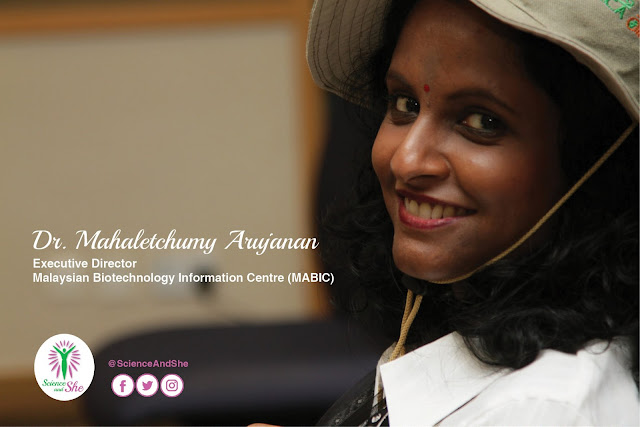The International Service for the Acquisition of Agri-biotech Applications (ISAAA) and its network of
Biotechnology Information Centers launched a campaign on social media which
aims to empower women in science. The campaign called Science and She,
features scientists and science communicators who tell their stories and
aspirations for science and the society with the hope that the stories will
help bridge the gap between science and the public.
For each week, one female scientist or
science communicator serves as the curator of the Science and She social
media pages on Facebook, Twitter, and Instagram. Recently, Dr. Mahaletchumy Arujanan, a science communication
expert and Executive Director of the Malaysian
Biotechnology Information
Center
According to Dr. Arujanan, science
communication is relatively a new field and so much needs to be done in this
area in the developing world. She calls on scientists to be “civic scientists” to
bridge the knowledge gap between the scientific community and the society. She
encouraged them to reach out to the people, engage them, make them understand
and appreciate science and research.
Recognitions
Empowering
others with scientific knowledge and helping them to make informed decisions gives Dr. Maha a tremendous satisfaction. Her contributions
to science communication were first recognized by The World Academy of Sciences
(TWAS) with the awarding of the 2010 TWAS Regional Prize for Public
Understanding of Science for East, SEA and the Pacific Region. Another
recognition came in 2015, when Scientific American’s WorldView named her
as one of the 100 most influential persons in biotech in the world. In
the same year, Biotech Law Report published by Mary Ann Liebert in the USA
The
importance of science communication
"Communicating
and engaging the public with science and biotechnology is crucial. To make
informed decisions, every individual needs some basic understanding of science.
And this is exactly what we do at the Malaysian Biotechnology Information Centre
(MABIC)...we empower the public with scientific
knowledge. Join us in our rally to support science and science-based decisions,"
says Dr. Arujanan.
This is the reason why she loves her
job as a science communicator. “It's really fulfilling to see that my job
translates into science-based policies, regulations, and it helps to ensure
food security, mitigate climate change, have sustainable agricultural
practices, and in the alleviation of poverty…I’m a strong advocate of
biotechnology. I strongly believe that if this field is deployed ethically, it
can solve many of the problems that we face today," she added.
Dr.
Arujanan emphasized that at present, there are several means to disseminate
information on science/biotechnology and to engage the public. We do not have
to solely depend on the mainstream media. While MABIC resorted to creating a
print media that has been digitalized, social media offers another powerful
tool as a mouthpiece for scientists and science communicators. Their monthly
newspaper, The Petri Dish, is the first science newspaper in Malaysia , distributed to major universities,
research institutes, hospitals, government agencies, government ministries and
schools across Malaysia as
well as in Indonesia
Women in STEM
Dr.
Arujanan recognized the tremendous increase in the number of women in science
careers such as scientists, engineers, mathematicians, and professionals in
other STEM-related areas. According to her, this is really an achievement of progressive
policies, government measures, and also the society that allowed women to
pursue their dreams around the world.
“But
the truth is we have not achieved equality yet with our male counterparts.
While the number of girls is increasing in the universities, there is still a leaky pipe somewhere along
the career path. We still do not see enough women at the pinnacle of
organizations, at the decision-making positions and in the boardrooms,” she
highlights.
“As a trained science
communicator, I feel we have to take the onus to inspire young girls to pursue
STEM education and careers. We need to be their mentors and role models. We
need to share our stories, journey, accomplishments, and challenges with them.
More importantly, we need to stand up for our rights so we pave a road that is
with fewer obstacles for the next generation. So that, their journey becomes
sweeter than ours and they could contribute much more than us,” Dr. Arujanan
stressed.



No comments:
Post a Comment